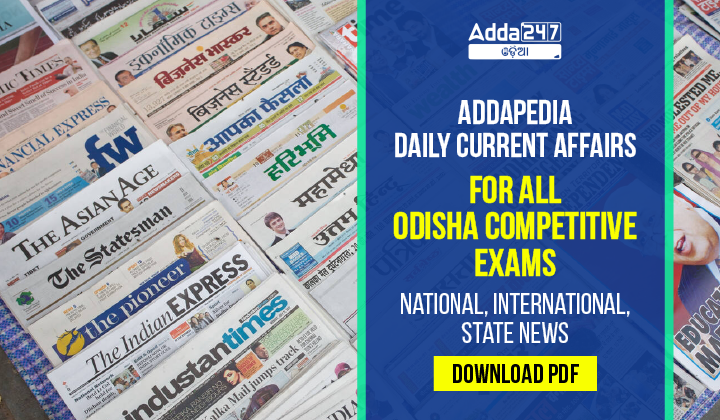As you are aware, in all competitive exams, the “Daily Current Affairs Section” holds significant importance in determining the cutoff scores. Therefore, if you excel in this section, you will have a better chance of achieving higher marks in these exams and securing a spot on the merit list.
Addapedia Odisha – Daily Current Affairs – 25 June 2024
| National and International News |
| Critical minerals |
Why in the news?
- The Union Mines Minister launched a new auction tranche for mining rights in 21 blocks of critical and strategic minerals.
About Critical minerals:
- Critical minerals are natural resources essential for the economy and national security but have supply chain risks due to geopolitical, economic, or other factors.
- Critical minerals and their Uses:
- Phosphorite: Used in fertilizers for agriculture.
- Lithium: Essential for batteries, especially in electric vehicles and energy storage.
- Graphite: Used in batteries, lubricants, and as a refractory material.
- Manganese: Important in steel production and battery manufacturing.
- Rare Earth Elements: Used in electronics, renewable energy technologies, and defense applications.
- Cobalt: Used in batteries and superalloys.
- Nickel: Used in stainless steel, batteries, and various alloys.
- Supply Chain Risks:
- Geopolitical tensions and trade restrictions.
- Concentration of supply in a few countries (e.g., China, Democratic Republic of Congo).
- Environmental and ethical concerns related to mining practices.
|
| Intergovernmental Platform on Biodiversity and Ecosystem Services (IPBES) |
Why in the news?
- The Intergovernmental Platform on Biodiversity and Ecosystem Services (IPBES) has recently been awarded the 2024 Blue Planet Prize.
About IPBES:
- Established: 2012
- Purpose: Strengthen the science-policy interface for biodiversity and ecosystem services for conservation and sustainable use of biodiversity.
- Role:
- Provides policymakers with objective scientific assessments about the state of knowledge regarding the planet’s biodiversity, ecosystems, and the benefits they provide.
- Offers tools and methods to protect and sustainably use vital natural assets.
- Inspiration: Independent body inspired by the Intergovernmental Panel on Climate Change (IPCC) and the Millennium Ecosystem Assessment.
- Relation to the UN:
- Not a United Nations body.
- United Nations Environment Programme (UNEP) provides secretariat services to IPBES since 2013, at the request of the IPBES Plenary and with the authorization of the UNEP Governing Council.
- Membership: India is a member country.
- Governing Body:
- IPBES Plenary made up of representatives of member States.
- Meets once per year.
- Secretariat: Located in Bonn, Germany.
|
| Iberian lynx |
Why in the news?
- The Iberian lynx, once one of the rarest cat species globally, has improved its status from ‘endangered’ to ‘vulnerable’ on the IUCN Red List.
About Iberian lynx:
- Endemic Species: One of two carnivore species endemic to Europe (other being European mink, Mustela lutreola).
- Characteristics:
- World’s most endangered cat species.
- Pointy ears, long legs, and leopard-like spotted fur.
- Behavior:
- Generally nocturnal.
- Activity patterns synchronized with major prey (rabbits).
- Habitat:
- Requires variable terrain below 1300 m.
- Prefers a mosaic of closed Mediterranean scrubland interspersed with open patches of grassland.
- Often found in areas with marsh ecotones.
- Distribution:
- Once widespread throughout the Iberian Peninsula.
- Now sparsely distributed in Spain and Portugal.
- Conservation Status:
- IUCN Red List: Vulnerable.
- CITES: Appendix II.
|
| e-Samridhi Portal |
Why in the news?
- The Union Minister of Agriculture & Farmers’ Welfare and Rural Development has urged state governments to encourage more farmers to register on the e-Samridhi portal to avail the facility of assured procurement.
About e-Samridhi Portal:
- Launched through:
- National Agricultural Cooperative Marketing Federation of India Ltd. (NAFED)
- National Cooperative Consumers’ Federation of India Limited (NCCF)
- Purpose: Registration of farmers for government procurement of pulses at Minimum Support Prices (MSP).
- Portal Registration:
- Can be done directly by farmers
- Can be done through Primary Agricultural Credit Societies (PACS) and Farmer Producer Organizations (FPOs)
- Payment:
- Made by NAFED directly into the farmers’ mapped bank accounts
- No intermediary agency involved
|
| Indus Water Treaty (IWT) |
Why in the news?
- A Pakistani delegation recently arrived in Jammu for ongoing discussions about the 1960 Indus Water Treaty (IWT).
About IWT:
- Date of Signing: The Indus Water Treaty was signed on September 19, 1960.
- Signatories: The treaty was signed by India and Pakistan, with the World Bank acting as a third-party guarantor.
- Rivers Covered: The treaty governs the use of waters from the Indus River system, which includes six rivers:
- The Indus,
- Jhelum,
- Chenab,
- Ravi,
- Beas, and
- Sutlej.
- Allocation of Rivers:
- Eastern Rivers: India has exclusive rights over the waters of the Ravi, Beas, and Sutlej.
- Western Rivers: Pakistan has control over the waters of the Indus, Jhelum, and Chenab, although India is allowed limited use for agricultural, transport, and power generation purposes.
- Permanent Indus Commission:
- The treaty established the Permanent Indus Commission, comprising one commissioner from each country.
- The commission is tasked with the administration of the treaty and the resolution of disputes.
- Duration: The treaty has no expiration date and is intended to remain in force unless both countries agree to amend or terminate it.
|
| Copyright © by Adda247
All rights are reserved. No part of this document may be reproduced, stored in a retrieval system or transmitted in any form or by any means, electronic, mechanical, photocopying, recording or otherwise, without prior permission of Adda247. |








